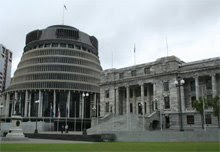The Sunday just gone (30 Nov) signaled the beginning of Advent.
Advent is an important tradition in the Christian church, as it marks the start of the lead up to the birth of Christ (and hence Christmas).
For everyone else (and many Christians too) Advent also marks start of the calendar that has little chocolates behind each door; and is otherwise a good word to use in scrabble.
Advent is commonly observed (at least in Baptist NZ), by the lighting of five candles, one each week till Christmas itself (week 1- Hope, 2 - Peace, 3 - Love, 4 - Joy), and the fifth is the Christ candle (white coloured) and lit on Christmas day.
It's all very pretty and really adds something to the weeks before Christmas (otherwise overrun by endless advertising and jingles).
Of course; it never actually happened in the bible.
Mary was a bit preoccupied at the time to think about lighting candles (with all the riding the donkey, and looking for a place to give birth going on), Joseph was more concerned about getting back home safely, and the wise men hadn't arrived yet.
So where did Advent come from? The early church - people made it up (arguably with God's influence). History otherwise regarding Advent is a bit vague, it may have started as early as the 4th century but that is still 300-400 years later than the birth of Christ.
There are many traditions that are sourced directly from the Bible - communion (Matthew 26:26-) and baptism (Matthew 3:13-) being two significant ones that spring to mind. These traditions were acted out by Jesus and are therefore given serious weight in the church today (even if you don't believe in Jesus, I hope you can respect that for those who do, following His actions is really important).
And there are these other traditions that have developed over the centuries (for good or bad), and have merged with the originals. Funny how humans do that.
Does it matter?
As with most things, the answer is yes and no. There's no point blindly repeating something that you don't understand or believe to be true; so it's at least worth asking some questions as to what it all means (Christians strangely enough ask questions all the time, because we often don't know the answers).
If you don't understand a Christian tradition (or any tradition) I suggest you investigate further.
Tradition has its positives as well:
My family has for many years assembled the Christmas tree in the first week of December (sadly I have missed out recently, being in the wrong city). Each time we play the same (often terrible) Christmas music, and place the dozens (or hundreds) of ornaments on the tree, and at the end we get to turn on the lights and look at the twinkling glow.
Our tradition is associated with good times, and family bonding. It may only be a tradition for my family, but it's a good one.
So, this December I invite you to think about Advent - even if for the chocolate - as it might add new dimensions to your lead up to Christmas.
Hope. Peace. Love. Joy.
Merry Christmas.
Sail Croatia
9 years ago




No comments:
Post a Comment